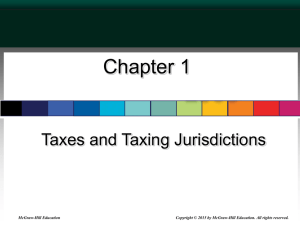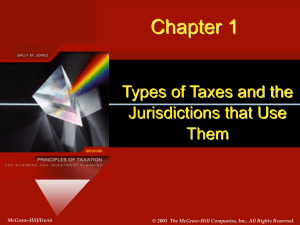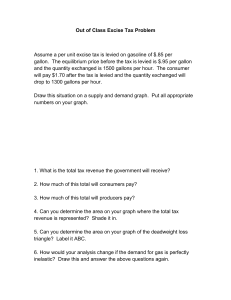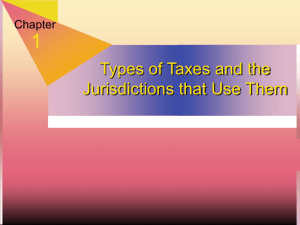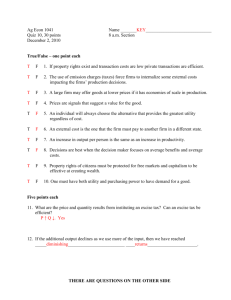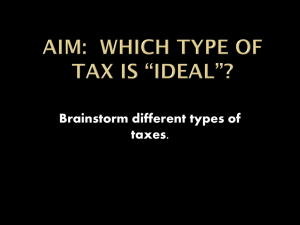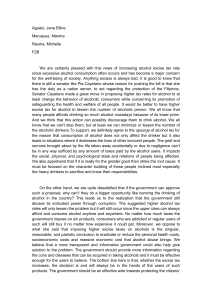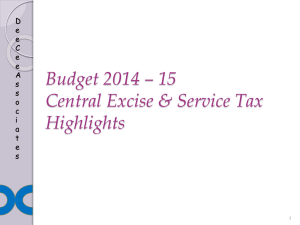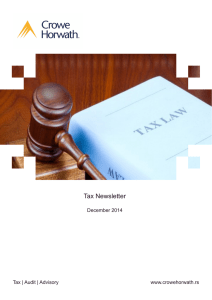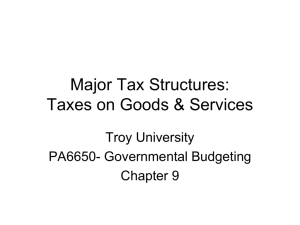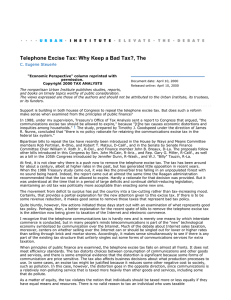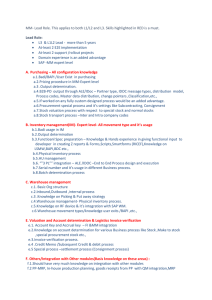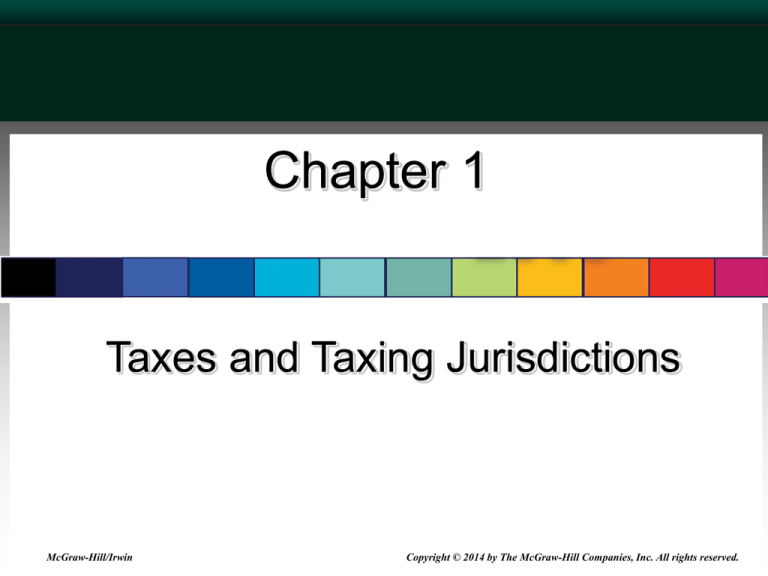
Chapter 1
Taxes and Taxing Jurisdictions
McGraw-Hill/Irwin
Copyright © 2014 by The McGraw-Hill Companies, Inc. All rights reserved.
1-2
Objectives
• Define tax, taxpayer, incidence, jurisdiction
• Express the relationship between tax base, rate, and
revenue as a formula
• Describe the taxes levied by local, state, and federal
government
• Explain why different jurisdictions compute for revenues
from the same taxpayer
• Identify the reasons why governments modify their tax
systems
• Describe the three primary sources of federal tax law
1-3
Definitions
• Tax = compulsory payment to support
the cost of government
• contrast with fine/penalty or user fee
• Taxpayer = any person or organization that pays
tax (includes individuals and corporations)
• Incidence = ultimate economic burden of a tax
• May not fall on the person or organization who pays tax
• Jurisdiction = right of a government to tax
1-4
Tax Formula
• Tax = rate × base
• Rate can be:
• Flat (single rate applies to entire tax base)
• Graduated (multiple rates apply to portions (brackets) of
tax base)
• Base is an item, occurrence, transaction, or activity
on which a tax is levied (expressed in monetary
terms)
• Revenue is total tax collected by the government
• Increased by increasing either rate or base
1-5
Two Ways to Characterize Taxes
• Frequency with which tax occurs
• Transaction (event) based taxes, such as:
• Sales or excise tax
• Estate or gift tax
• Activity based tax, such as:
• Income tax
• Link to specific government expenditures
• Earmarked to finance designated projects, such as:
• Social Security and Medicare
• EPA’s environment excise taxes
1-6
State and Local Taxes
• Property (ad valorem taxes)
• Real property tax
• Abatements often granted
to entice new business
• Personal property tax
• Household tangibles (vehicles)
• Business tangibles
• Intangibles (securities)
1-7
State and Local Taxes
• Sales/use
• Broad-based but often excludes necessities (food, drugs)
• Personal responsibility for use tax
• Excise tax
• Imposed on retail sale of specific goods or services
• Cigarettes and gasoline
• Hotel and motel accommodations
• Income tax
• Personal
• Corporate
1-8
Federal Taxes
• Individual income tax
• Corporate income tax
• Employment taxes
• Social Security
• Medicare
• Unemployment taxes
• Excise taxes
• Transfer taxes
• Gift
• Estate
• Generation-skipping
• Income taxes
• Individual
• Corporation
1-9
History of Federal Income Tax
• Pre-1861: tariffs, excise and property taxes
• First income tax enacted to pay for Civil War in
1861, expired in 1871
• First permanent income tax passed in 1894, but
struck down by Supreme Court as unconstitutional
• Sixteenth Amendment ratified in 1913 made the
income tax constitutional
• Internal Revenue Code was enacted in 1939 and
subsequently revised in 1954 and 1986
1-10
Foreign Taxes
• Income taxes similar to U.S.
• Value added tax (VAT)
• Similar to a sales tax on the incremental value added by a
business at each stage of the production process
• Business can claim a credit for VAT paid to a supplier with
proof of payment
1-11
Jurisdictional Competition
• Increasing the tax rate or expanding the definition of
the tax base can cause taxpayers to flee the tax
jurisdiction
• Current trends in increasing the tax base
• Annexation to expand city property
• Sales tax expansion
• Lotteries and casino gambling
1-12
Sales Tax Expansion
• The Supreme Court case of Quill Corporation vs.
North Dakota held that mail-order companies need
not collect sales tax from customers located in
states where the company did not have physical
presence
• What are the implications for the internet?
1-13
Sources of Tax Law
• Statutory authority is the Internal Revenue Code
• Administrative authority
• Treasury regulations
• IRS Revenue Rulings and Revenue Procedures
• Federal judicial authority
• Supreme Court
• Appellate courts
• Trial courts
• Tax Court
• District Court
• Court of Federal Claims
1-14

